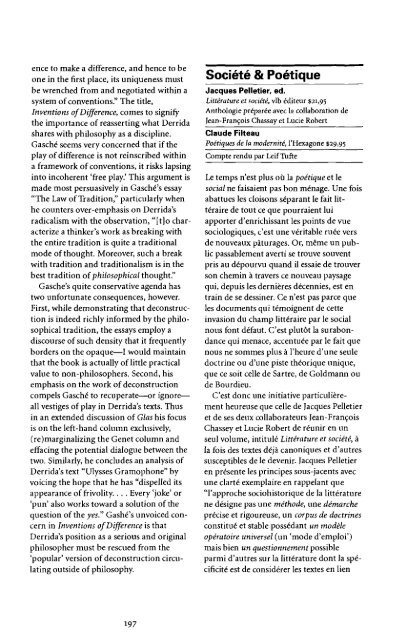Jean Rivard - University of British Columbia
Jean Rivard - University of British Columbia
Jean Rivard - University of British Columbia
Create successful ePaper yourself
Turn your PDF publications into a flip-book with our unique Google optimized e-Paper software.
ence to make a difference, and hence to be<br />
one in the first place, its uniqueness must<br />
be wrenched from and negotiated within a<br />
system <strong>of</strong> conventions." The title,<br />
Inventions <strong>of</strong> Difference, comes to signify<br />
the importance <strong>of</strong> reasserting what Derrida<br />
shares with philosophy as a discipline.<br />
Gasché seems very concerned that if the<br />
play <strong>of</strong> difference is not reinscribed within<br />
a framework <strong>of</strong> conventions, it risks lapsing<br />
into incoherent 'free play.' This argument is<br />
made most persuasively in Gasché's essay<br />
"The Law <strong>of</strong> Tradition," particularly when<br />
he counters over-emphasis on Derrida's<br />
radicalism with the observation, "[t]o characterize<br />
a thinker's work as breaking with<br />
the entire tradition is quite a traditional<br />
mode <strong>of</strong> thought. Moreover, such a break<br />
with tradition and traditionalism is in the<br />
best tradition <strong>of</strong> philosophical thought."<br />
Gasche's quite conservative agenda has<br />
two unfortunate consequences, however.<br />
First, while demonstrating that deconstruction<br />
is indeed richly informed by the philosophical<br />
tradition, the essays employ a<br />
discourse <strong>of</strong> such density that it frequently<br />
borders on the opaque—I would maintain<br />
that the book is actually <strong>of</strong> little practical<br />
value to non-philosophers. Second, his<br />
emphasis on the work <strong>of</strong> deconstruction<br />
compels Gasché to recuperate—or ignore—<br />
all vestiges <strong>of</strong> play in Derrida's texts. Thus<br />
in an extended discussion <strong>of</strong> Glas his focus<br />
is on the left-hand column exclusively,<br />
(re)marginalizing the Genet column and<br />
effacing the potential dialogue between the<br />
two. Similarly, he concludes an analysis <strong>of</strong><br />
Derrida's text "Ulysses Gramophone" by<br />
voicing the hope that he has "dispelled its<br />
appearance <strong>of</strong> frivolity... . Every 'joke' or<br />
'pun' also works toward a solution <strong>of</strong> the<br />
question <strong>of</strong> the yes." Gashé's unvoiced concern<br />
in Inventions <strong>of</strong> Difference is that<br />
Derrida's position as a serious and original<br />
philosopher must be rescued from the<br />
'popular' version <strong>of</strong> deconstruction circulating<br />
outside <strong>of</strong> philosophy.<br />
Société & Poétique<br />
Jacques Pelletier, ed.<br />
Littérature et société, vlb éditeur $21,95<br />
Anthologie préparée avec la collaboration de<br />
<strong>Jean</strong>-François Chassay et Lucie Robert<br />
Claude Filteau<br />
Poétiques de la modernité, l'Hexagone $29,95<br />
Compte rendu par Leif Tufte<br />
Le temps n'est plus où la poétique et le<br />
social ne faisaient pas bon ménage. Une fois<br />
abattues les cloisons séparant le fait littéraire<br />
de tout ce que pourraient lui<br />
apporter d'enrichissant les points de vue<br />
sociologiques, c'est une véritable ruée vers<br />
de nouveaux pâturages. Or, même un public<br />
passablement averti se trouve souvent<br />
pris au dépourvu quand il essaie de trouver<br />
son chemin à travers ce nouveau paysage<br />
qui, depuis les dernières décennies, est en<br />
train de se dessiner. Ce n'est pas parce que<br />
les documents qui témoignent de cette<br />
invasion du champ littéraire par le social<br />
nous font défaut. C'est plutôt la surabondance<br />
qui menace, accentuée par le fait que<br />
nous ne sommes plus à l'heure d'une seule<br />
doctrine ou d'une piste théorique unique,<br />
que ce soit celle de Sartre, de Goldmann ou<br />
de Bourdieu.<br />
C'est donc une initiative particulièrement<br />
heureuse que celle de Jacques Pelletier<br />
et de ses deux collaborateurs <strong>Jean</strong>-François<br />
Chassey et Lucie Robert de réunir en un<br />
seul volume, intitulé Littérature et société, à<br />
la fois des textes déjà canoniques et d'autres<br />
susceptibles de le devenir. Jacques Pelletier<br />
en présente les principes sous-jacents avec<br />
une clarté exemplaire en rappelant que<br />
"l'approche sociohistorique de la littérature<br />
ne désigne pas une méthode, une démarche<br />
précise et rigoureuse, un corpus de doctrines<br />
constitué et stable possédant un modèle<br />
opératoire universel (un 'mode d'emploi')<br />
mais bien un questionnement possible<br />
parmi d'autres sur la littérature dont la spécificité<br />
est de considérer les textes en lien<br />
197

















